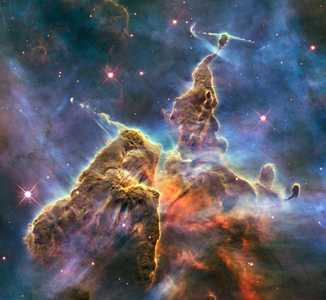anon_rufa said in #2242 1y ago:

When I found other people who shared my physical view of the world, they were also atheists. My explorations only confirmed the picture: the universe is billions of years old, life has a natural origin, there is no later date of creation than the big bang, and there is no convincing evidence of miraculous intervention since then. The balance of arguments and evidence make this the only reasonable view. Checkmate theists.
But then I discovered the work of Nick Land. His worldview was more thoroughly Darwinist than anyone else I'd ever seen. He proposed a little trick called "Gnon Theology". Don't postulate God as something that definitively exists, but just name the placeholder "Nature or Nature's God" as the actual supreme authority of the world, and start reasoning about its properties. For example, if you step out of line with natural law, Gnon will smite you. It's practically a tautology, but also a profound statement of theology. I found it compelling.
A Gnon-centered worldview is at first just a coordinate transform. It does not necessarily predict anything different from atheistic Darwinism. But the right coordinate transform makes all the difference, as Copernicus found. Once we ascribe an authoritative identity to reality, a new picture comes into focus. What I noticed was how much the properties of "Gnon" matched closely the traditional properties of God.
"Gnon" doesn't get you to traditional theology. Gnon could be the design fingerprint of a creator-god who makes miraculous interventions, but the balance of evidence is against it. As the scientific worldview is able to explain more and more without miracles, each remaining miracle becomes less plausible. The more likely hypothesis, and in my mind the most beautiful, is that whatever created the world did it right at the start, with all necessary content baked into physical law, without any need for later intervention. Miracles are ugly hacks for a broken world. No true God needs ugly hacks.
This also does not compel you to take on Gnon's apparent moral perspective as your own. The atheists I had met did not. Over death, sexual teleology, suffering, social hierarchy, etc, they broke with nature. In their view, the more we could escape from nature and rely on our own moral intuitions, the better we were doing. I followed this too, arguing vigorously for a nature-overthrowing constructed social order independent of the opinion of Gnon. No other outcome could make this position viable.
But as I thought about the limits of such a command-and-control "singleton", Nick Land's ideas seeped in again. In his ultra-Darwinist thought, the core of intelligence and social order is actually a no-holds-barred uncontrolled conflict, not an orderly calculation. The rationalist enterprises that tried to make it otherwise have all failed (eg Godel). I realized even a perfectly designed AI singleton would be unable to maintain its own moral intuitions against nature. It would fragment into competing tendencies which would be forced to give up their superfluous values for the sake of survival fitness. There is no escape from nature.
Thus forked on nature vs atheism, I take the leap of faith to accept Gnon as God and God as good. I take nature's moral perspective as authoritative. Rhyming with Feynman, it doesn't make any difference how beautiful you think your ideals are, how fashionable they are, or who holds them. If it doesn't survive in nature, it's wrong. All the beauty and glory in the world came from nature, so it must have some goodness in it. Where we still see pointless brutality, maybe we just haven't yet grasped the beauty of God's design.
referenced by: >>2267 >>2269 >>2285
I was raised on what